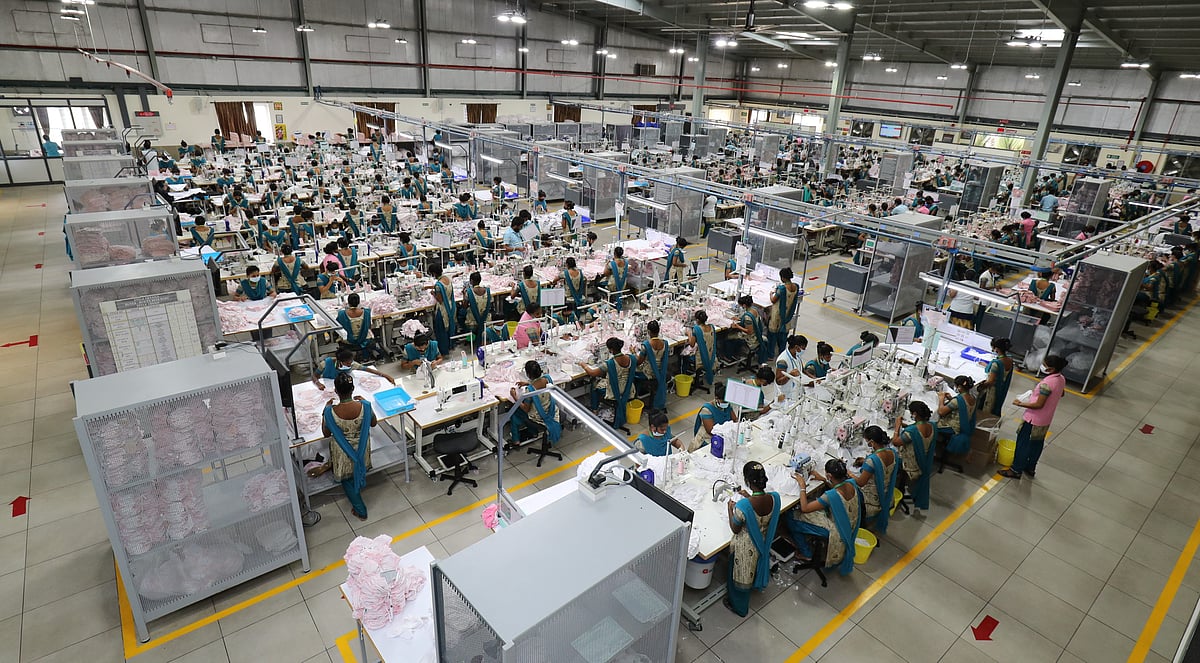The Tiruppur garment industry is staring at an existential crisis, as job losses and shutdowns of factories in the aftermath of US tariff implementation have started playing out over the past two weeks.
Several exporters have closed their garment-manufacturing units after US buyers either stopped purchases or demanded steep discounts. These exporters, with a strong presence in the US, Europe, and other international markets for knitted garments, say some of them rely on the US for nearly 70–100% of their sales.
Tiruppur employs over 8-9 lakh people in their 2,500 factories across the district. Over 60% of these are women. The US has imposed a 50% additional tariff on most Indian goods effective from 27 August 2025.
With Christmas being the peak season in the US, shipments from Indian exporters usually begin around September–October. Normally, nearly $2 billion worth of goods are exported to the US market alone during this period. But this year, exporters and retailers are being forced to absorb deep cuts in their margins due to the 50% tariff imposed by the US on Indian goods.
R. Rajkumar, MD of RRK Cottons India Pvt. Ltd., said: “I have five factories in Tiruppur and Palladam, where we employ around 2,000 people. I am stuck with around ₹60 crore worth of finished goods meant for the US. We have already shut down two factories catering to the US market and laid off nearly 1,000 people.”
He added that goods worth nearly ₹25 crore are ready to be shipped to the US, but buyers are demanding 20–25% discounts on current as well as future orders. Rajkumar, who supplies to Walmart and other brands, warned that if fresh orders do not come in after November 15, the company may have to suspend operations except for factories serving the European market.
Another exporter, who ships 70% of his goods to the US, echoed the concern.
“I have four factories, of which one has been closed temporarily. Around 850 people have been laid off for now. Nearly 30% of my ₹62 crore worth of goods have been hit by the tariffs,” he said on condition of anonymity. “US buyers are asking for 15–20% discounts on present and future orders.”
A third exporter said one of his two factories, which together employ 5,000 workers, has been shut, affecting 1,000 employees. He exports entirely to the US and is stuck with goods worth ₹70 crore. “US buyers are now demanding 20–30% discounts. If tariffs continue beyond January, I may have to shut my second factory as well,” he said.
“The garment industry is labour-intensive. It takes 4–5 years to build a business. I have invested around ₹150 crore in these factories. With competitors like Bangladesh, Vietnam, and Cambodia, buyers have many options. Unless the Indian government negotiates better terms with the US, we face a very difficult future,” the exporter added.
Exporters do not believe Europe can absorb the goods diverted from the US. “Europe is a much smaller market, capable of taking only 27% of our output against the US’s 33%,” one exporter said. He added that he had taken bank loans worth ₹100 crore, all of which are now at risk.
Raja Shanmugam, former president of Tiruppur Exporters’ Association (TEA), said: “A lot of negotiations are underway with US buyers. We don’t yet have full details of factory closures or future orders. Typically, Tiruppur executes three to four cycles of orders annually, worth around ₹44,000 crore. Of this, 34% is shipped to the US. For this cycle alone, around ₹3,500 crore worth of orders are stuck.”
The crisis is expected to create ripple effects. A senior executive at a US-based liaison office in Coimbatore explained: “India is the largest exporter of cotton garments. Christmas is peak season for the US, and we usually ship goods worth nearly $2 billion during this period alone. In Dindigul, I hear some spinning mills are working on rotation and laying off employees. This will hit ancillary sectors such as carton box, polybag manufacturing, and transportation.”
Cotton farmers too are bracing for losses, with crop prices likely to fall sharply in the next season.
Exporters and industry associations are now pinning their hopes on the government striking a favourable deal with the US.
Published on: 28 September 2025
Source: The New Indian Express

